Microcid-SR Capsule 10's
MRP ₹134
(Inclusive of all Taxes)
₹20.1 Cashback (15%)
Provide Delivery Location
Online payment accepted
 Prescription drug
Prescription drugWhats That
Composition :
Manufacturer/Marketer :
Consume Type :
Expires on or after :
Return Policy :
About Microcid-SR Capsule
Microcid-SR Capsule belongs to the group of pain killers known as NSAID's (Non-Steroidal Anti-Inflammatory Drugs) used to relieve symptoms caused by osteoarthritis, ankylosing spondylitis, and rheumatoid arthritis such as stiffness, swelling and joint pain. Microcid-SR Capsule is also used to treat acute gouty arthritis, musculoskeletal pain, lower back pain, period pain, pain following joint and bone surgery.
Microcid-SR Capsule works by blocking the effect of a chemical messenger in your body, known as cyclo-oxygenase (COX) enzymes that make another chemical 'prostaglandins' (PG). These prostaglandins are produced at injury sites and cause pain and swelling. By blocking the effect of COX enzymes, lesser PGs are produced, which reduces mild to moderate pain and inflammation at the injured or damaged site.
You are advised to take Microcid-SR Capsule for as long as your doctor has prescribed it for you depending on your medical condition. In some cases, you may experience certain common side-effects such as headache, dizziness, diarrhoea, vomiting, and constipation. Most of these side-effects do not require medical attention and will resolve gradually over time. However, you are advised to talk to your doctor if you experience these side-effects persistently.
Microcid-SR Capsule can increase your risk of fatal heart attack or stroke. So, if you have had any recent heart surgery, do not use Microcid-SR Capsule . Microcid-SR Capsule increases the chances of stomach ulcers and bleeding. To treat your condition effectually, continue taking Microcid-SR Capsule for as long as your doctor has prescribed. To avoid recurring symptoms, do not stop it midway. Do not take Microcid-SR Capsule if you are pregnant or breastfeeding unless prescribed. Microcid-SR Capsule causes drowsiness and dizziness, so drive with caution. Microcid-SR Capsule should not be given to children as safety and efficacy have not been established. Avoid consuming alcohol along with Microcid-SR Capsule as it could lead to increased drowsiness and dizziness; it might also increase the risk of stomach bleeding. Keep your doctor informed about your health condition and medicines to rule out any side-effects.
Uses of Microcid-SR Capsule
Directions for Use
Key Benefits
Microcid-SR Capsule belongs to the group of pain killers known as NSAID's (Non-Steroidal Anti-Inflammatory Drugs). Microcid-SR Capsule is used to relieve symptoms caused by osteoarthritis, ankylosing spondylitis, and rheumatoid arthritis such as stiffness, swelling and joint pain. Microcid-SR Capsule is also used to treat acute gouty arthritis, musculoskeletal pain, lower back pain, period pain, pain following joint and bone surgery. Microcid-SR Capsule works by blocking the effect of a chemical messenger in your body, known as cyclo-oxygenase (COX) enzymes that make another chemical 'prostaglandins' (PG). These prostaglandins are produced at injury sites and cause pain and swelling. By blocking the effect of COX enzymes, lesser PGs are produced, which reduces mild to moderate pain and inflammation at the injured or damaged site.
Storage
- Inform your doctor about the nausea and discuss possible alternatives to the medication or adjustments to the dosage.
- Divide your daily food intake into smaller, more frequent meals to reduce nausea.
- Opt for bland, easily digestible foods like crackers, toast, plain rice, bananas, and applesauce.
- Avoid certain foods that can trigger nausea, such as fatty, greasy, spicy, and smelly foods.
- Drink plenty of fluids, such as water, clear broth, or electrolyte-rich beverages like coconut water or sports drinks.
- Use ginger (tea, ale, or candies) to help relieve nausea.
- Get adequate rest and also avoid strenuous activities that can worsen nausea.
- Talk to your doctor about taking anti-nausea medication if your nausea is severe.
- Record when your nausea occurs, what triggers it, and what provides relief to help you identify patterns and manage your symptoms more effectively.
- Preventing Vomiting (Before it Happens)
- Take medication exactly as prescribed by your doctor. This can help minimize side effects, including vomiting.
- Having a small meal before taking your medication can help reduce nausea and vomiting.
- Talk to your doctor about taking anti-nausea medication along with your prescribed medication.
- Managing Vomiting (If it Happens)
- Try taking ginger in the form of tea, ale, or candy to help alleviate nausea and vomiting.
- What to Do if Vomiting Persists
- Consult your doctor if vomiting continues or worsens, consult the doctor for guidance on adjusting your medication or additional treatment.
- Hydrate your body: Drink enough water to prevent dehydration and headaches.
- Calm Your Mind: Deep breathing and meditation can help you relax and relieve stress.
- Rest and Recharge: Sleep for 7-8 hours to reduce headache triggers.
- Take rest: lie down in a quiet, dark environment.
- Cold or warm compresses can help reduce tension.
- Stay Upright: Maintain good posture to keep symptoms from getting worse.
- To treat headaches naturally, try acupuncture or massage therapy.
- Over-the-counter pain relievers include acetaminophen and ibuprofen.
- Prescription Assistance: Speak with your doctor about more substantial drug alternatives.
- Severe Headaches: Seek emergency medical assistance for sudden, severe headaches.
- Frequent Headaches: If you get reoccurring headaches, consult your doctor.
- Headaches with Symptoms: Seek medical attention if your headaches include fever, disorientation, or weakness.
- Inform your doctor about dizziness symptoms. They may adjust your medication regimen or prescribe additional medications to manage symptoms.
- Follow your doctor's instructions for taking medication, and take it at the same time every day to minimize dizziness.
- When standing up, do so slowly and carefully to avoid sudden dizziness.
- Avoid making sudden movements, such as turning or bending quickly, which can exacerbate dizziness.
- Drink plenty of water throughout the day to stay hydrated and help alleviate dizziness symptoms.
- If you're feeling dizzy, sit or lie down and rest until the dizziness passes.
- Track when dizziness occurs and any factors that may trigger it, and share this information with your doctor to help manage symptoms.
- Eat fiber-rich foods like fruits, whole grains, and vegetables as a part of your diet.
- Minimize fasting, intense physical exercises, smoking and better to avoid drinking alcohol to reduce symptoms.
- Maintain a normal routine by having three meals a day and staying hydrated.
- Inform your doctor about your constipation symptoms. They may adjust your medication or advise alternative treatments.
- Stay hydrated by drinking sufficient of water (at least 8-10 glasses a day) to help soften stool and promote bowel movements.
- Increase fibre intake by eating foods high in fibre, such as fruits, whole grains, vegetables and legumes, to help bulk up the stool.
- Establish a bowel routine by trying to go to the bathroom at the same time each day to train your bowels.
- Engaging in regular exercise, like walking or yoga, can support in bowel movement stimulation.
- Consult your doctor if constipation persists, and discuss alternative treatments or adjustments to your medication.
Drug Warnings
Microcid-SR Capsule can increase your risk of having a fatal heart attack, chest pain (angina) or stroke. So, tell your doctor that you are using Microcid-SR Capsule before undergoing heart bypass surgery (CABG) or graft surgery. Do not take Microcid-SR Capsule if you are allergic to Microcid-SR Capsule , have severe heart failure, have suffered bleeding problems such as bleeding from stomach or bowels while taking any pain killers or you have liver or kidney problems. Do not take Microcid-SR Capsule if you are pregnant or breastfeeding unless prescribed. Microcid-SR Capsule causes drowsiness and dizziness, so drive only if you are alert. Microcid-SR Capsule should not be given to children as the safety have not been established. Avoid consuming alcohol along with Microcid-SR Capsule as it could lead to increased drowsiness and can increase the risk of stomach bleeding. Stop taking Microcid-SR Capsule and consult your doctor immediately if you have stomach pain or any signs of bleeding in intestine or stomach like blood in stools.
Drug-Drug Interactions
Drug-Drug Interactions
Login/Sign Up
Co-administration of Indomethacin with Cidofovir can increase the risk of kidney problems.
How to manage the interaction:
Taking Microcid-SR Capsule with Cidofovir is not recommended as it can lead to an interaction, it can be used if prescribed by a doctor. However, if you experience nausea, vomiting, decreased hunger, increased or decreased urination, weight gain or loss that occurs suddenly, fluid retention, swelling, shortness of breath, cramping in the muscles, weakness, confusion, and irregular heartbeat, consult a doctor immediately. Do not discontinue any medications without a doctor's advice.
Co-administration of Ketorolac together with Indomethacin may increase the risk of side effects in the gastrointestinal tract such as inflammation, bleeding, and ulcers.
How to manage the interaction:
Taking Microcid-SR Capsule with Ketorolac is not recommended, as it can result in an interaction, it can be taken if a doctor has advised it. However, if you experience unusual bleeding or bruising, dizziness, lightheadedness, red or black, tarry stools, coughing up or vomiting fresh or dried blood that looks like coffee grounds, severe headache, and weakness, consult a doctor. Do not stop using any medications without a doctor's advice.
The combined use of Microcid-SR Capsule and ketoprofen can increase the risk of side effects in the gastrointestinal tract such as inflammation, bleeding, ulceration, and rarely, perforation.
How to manage the interaction:
Taking Microcid-SR Capsule with Ketoprofen together can possibly result in an interaction, but it can be taken if your doctor has advised it. However, if you experience unusual bleeding or bruising, dizziness, lightheadedness, red or black, tarry stools, coughing up or vomiting fresh or dried blood that looks like coffee grounds, severe headache, and weakness, consult a doctor. Do not stop using any medications without a doctor's advice.
The combined use of diclofenac and Indomethacin can increase the risk of stomach bleeding and ulcers.
How to manage the interaction:
Co-administration of Diclofenac and Indomethacin can lead to an interaction, it can be taken if advised by your doctor. However, if you experience any symptoms like unusual bleeding or bruising, dizziness, lightheadedness, red or black, tarry stools, coughing up or vomiting fresh or dried blood that looks like coffee grounds, severe headache, and weakness, consult a doctor immediately. Do not stop using any medications without a doctor's advice.
Taking Indomethacin with Everolimus can increase the risk of kidney damage.
How to manage the interaction:
Although taking Everolimus and Indomethacin together can cause an interaction, it can be taken if a doctor has suggested it. However, if you experience nausea, vomiting, lack of appetite, increased or decreased urination, weight gain or loss that occurs suddenly, fluid retention, swelling, shortness of breath, cramping in the muscles, fatigue, weakness, disorientation, confusion, and irregular heartbeat, consult a doctor. Do not discontinue any medications without a doctor's advice.
Coadministration of Ketoconazole and Microcid-SR Capsule may increase the risk of liver damage.
How to manage the interaction:
Although taking Ketoconazole and Microcid-SR Capsule together can result in an interaction, it can be taken if a doctor has prescribed it. However, if you have any of the following symptoms: fever, chills, joint pain or swelling, unusual bleeding or bruising, skin rash, itching, fatigue, lack of appetite, nausea, vomiting, abdominal pain, dark urine, light stools, and/or yellowing of the skin or eyes, consult a doctor immediately. Do not discontinue any medications without a doctor's advice.
Using Dasatinib together with Microcid-SR Capsule may increase the risk of bleeding.
How to manage the interaction:
Co-administration of Microcid-SR Capsule with Dasatinib can result in an interaction, but it can be taken if a doctor has advised it. However, if you experience bruising, dizziness, red or black, tarry stools, severe headache, and weakness, consult the doctor. Do not stop using any medications without a doctor's advice.
Co-administration of Indomethacin with Ibrutinib can increase the likelihood and seriousness of side effects.
How to manage the interaction:
Taking Microcid-SR Capsule with Ibrutinib together can result in an interaction, but it can be taken if a doctor has advised it. However, if you experience unusual bleeding or bruising, dizziness, lightheadedness, red or black, tarry stools, coughing up or vomiting fresh or dried blood that looks like coffee grounds, severe headache, and weakness, consult a doctor. Do not stop using any medications without a doctor's advice.
Using Indomethacin with Enoxaparin can increase the risk of bleeding and hemorrhage.
How to manage the interaction:
Taking Microcid-SR Capsule with Enoxaparin together can result in an interaction, but it can be taken if your doctor has advised it. However, if you experience unusual bleeding or bruising, swelling, vomiting, blood in your urine or stools, headache, dizziness, or weakness, consult the doctor. Do not stop using any medications without a doctor's advice.
Co-administration of Indomethacin with Tenofovir alafenamide may increase the risk or severity of kidney problems.
How to manage the interaction:
Taking Microcid-SR Capsule with Tenofovir alafenamide together can result in an interaction, but it can be taken if a doctor has advised it. However, if you experience nausea, vomiting, lack of appetite, increased or decreased urination, weight gain or loss that occurs suddenly, fluid retention, swelling, breathing difficulty, cramping in the muscles, disorientation, confusion, and irregular heartbeat, consult a doctor. Do not stop using any medications without consulting a doctor.
Drug-Food Interactions
Drug-Food Interactions
Login/Sign Up
Diet & Lifestyle Advise
- Physical activity helps in strengthening muscles and relieves joint stiffness. Gentle activities like 20-30minutes of walking or swimming would be helpful.
- Performing yoga may also help in improving joint flexibility and pain management.
- Maintain a healthy weight by performing regular low-strain exercises and eating healthy food.
- Get adequate sleep as resting the muscles can help in reducing inflammation and swelling.
- Follow heat or cold therapy, apply a cold or hot compress on the joints for 15-20minutes regularly.
- De-stress yourself by meditating, reading books, taking a warm bubble bath or listen to soothing music.
- Acupuncture, massage and physical therapy may also be helpful.
- Eat food rich in antioxidants such as berries, spinach, kidney beans, dark chocolate, etc.
- Foods containing flavonoids help in reducing inflammation. These include soy, berries, broccoli, grapes and green tea.
- Avoid smoking and alcohol consumption.
Side Effects of Microcid-SR Capsule
- Headache,
- Dizziness
- Diarrhoea
- Vomiting
- Constipation
Habit Forming
Therapeutic Class
All Substitutes & Brand Comparisons
RX
Indomethacin Capsule 10's
₹22.5
(₹2.03 per unit)
83% CHEAPERRX
Out of StockIndoflam 75mg Capsule TR
Zydus Cadila
₹36.86
(₹3.32 per unit)
72% CHEAPERRX
Out of StockDonica-SR 75 Capsule 10's
Ipca Laboratories Ltd
₹85.8
(₹7.72 per unit)
35% CHEAPER
Author Details
We provide you with authentic, trustworthy and relevant information
Drug-Diseases Interactions
Drug-Diseases Interactions
Login/Sign Up
FAQs
Drug-Drug Interactions Checker List
- IBUPROFEN
- NAPROXEN
- ASPIRIN
- DULOXETINE
- METOPROLOL
- CELECOXIB
- PREDNISONE
Special Advise
- Your doctor may advise you to undergo tests for monitoring liver and kidney functioning, blood cell levels, effect on stomach and intestine.
- Regular monitoring of eye-sight via eye tests is advised if you have rheumatoid arthritis.
- Monitoring of blood pressure levels and heart functioning is recommended.
Disease/Condition Glossary
Osteoarthritis: It is a degenerative joint disease in which the two ends of the joints come together due to breakdown of a protective covering of cartilage. Due to the absence of this protective covering, the joints rub against each other, leading to pain and stiffness. Symptoms of osteoarthritis include pain, inflammation, stiffness, and tenderness. The main reason for osteoarthritis is age, the older you are, the more likely you could get osteoarthritis, thus known as degenerative disease, meaning that the joints wear-out as a person ages. Other reasons include a past injury such as torn cartilage, dislocated joints and ligament injuries.
Rheumatoid arthritis: It is an auto-immune disease (body's immune system attacks its tissue) which leads to joint pain and damage. Symptoms of rheumatoid arthritis include stiffness, pain, swelling, deformities and loss of joint function.
Ankylosing spondylitis: It causes pain and stiffness in the spine, which starts in the lower back and can spread to the neck, damaged joints or other parts of the body. Symptoms of ankylosing spondylitis include decreased flexibility which usually leads to hunched-forward posture, pain and back and joints.

Have a query?
Alcohol
Safe if prescribed
You are recommended to avoid alcohol consumption while taking Microcid-SR Capsule . Alcohol intake, along with Microcid-SR Capsule , may cause increased dizziness and drowsiness. It may also elevate the risk of stomach bleeding.
Pregnancy
Consult your doctor
It is not recommended to take Microcid-SR Capsule while you are pregnant. Please consult your doctor if you are pregnant or if you are having any concerns regarding this.
Breast Feeding
Consult your doctor
It is not recommended to take Microcid-SR Capsule while you are breastfeeding. Please consult your doctor if you are breastfeeding or if you are having any concerns regarding this.
Driving
Safe if prescribed
Microcid-SR Capsule may cause drowsiness, dizziness, tiredness and vision disturbances, do not drive or operate heavy machinery if you feel dizzy.
Liver
Consult your doctor
Dose adjustment may be needed. Microcid-SR Capsule should be taken with caution in patients with liver impairment/liver disease. Please consult your doctor if you have liver problems with symptoms of yellowing of skin/eyes, difficulty in peeing or feeling exhausted all the time.
Kidney
Consult your doctor
Dose adjustment may be needed. Microcid-SR Capsule should be taken with caution in patients with kidney impairment/kidney disease. Please consult your doctor if you have kidney impairment or any concerns regarding this.
Children
Safe if prescribed
Microcid-SR Capsule should not be used by children, as the efficacy and safety have not been established.

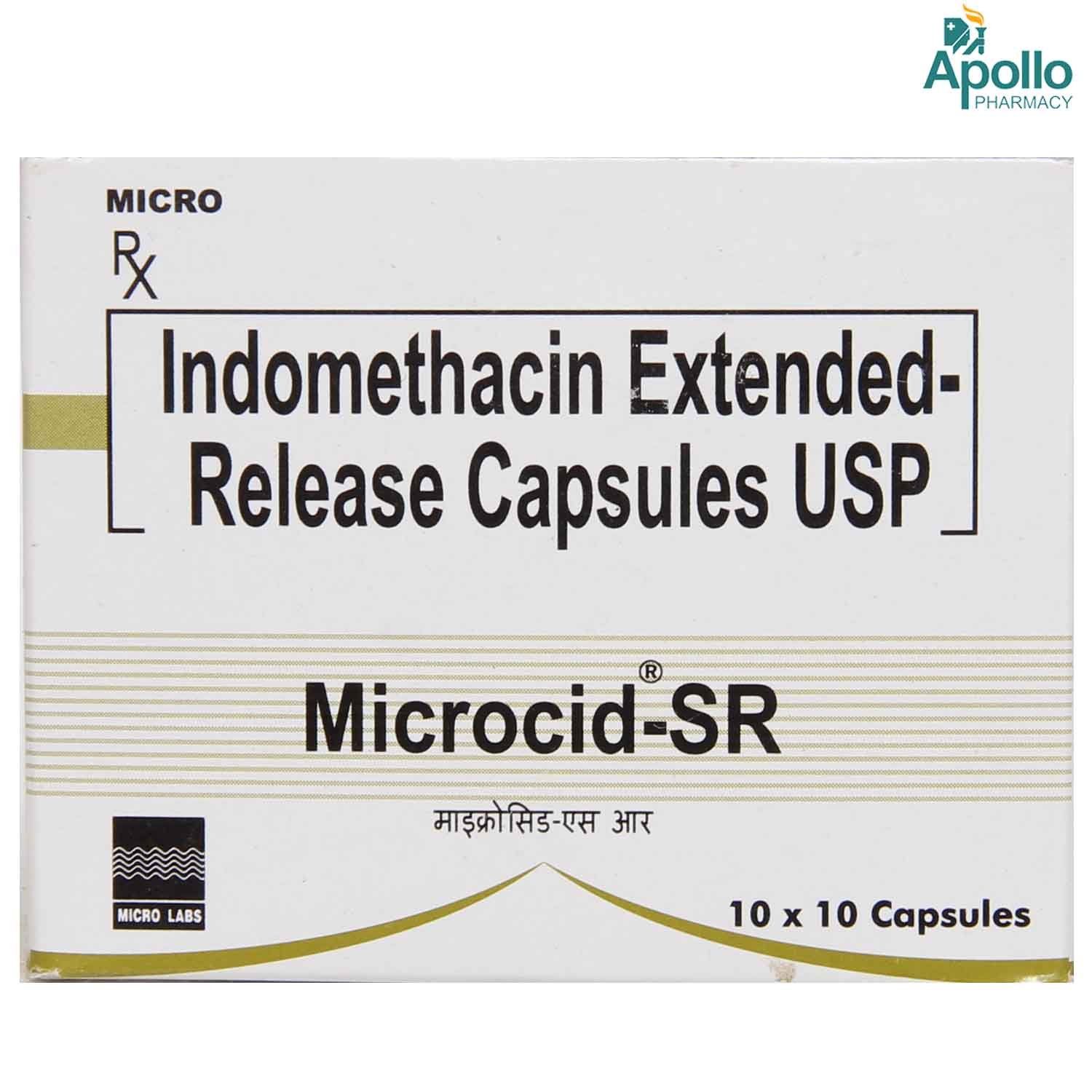
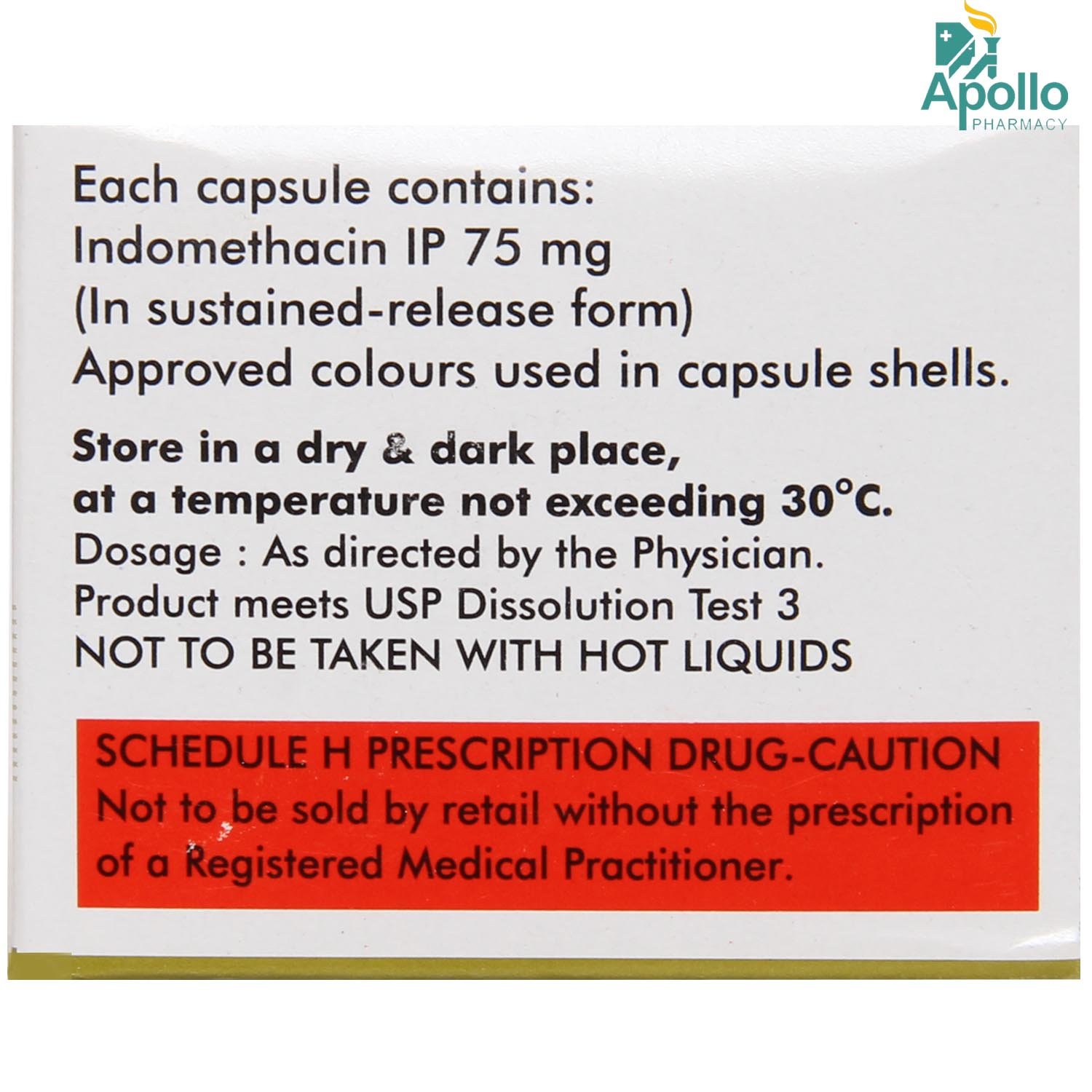
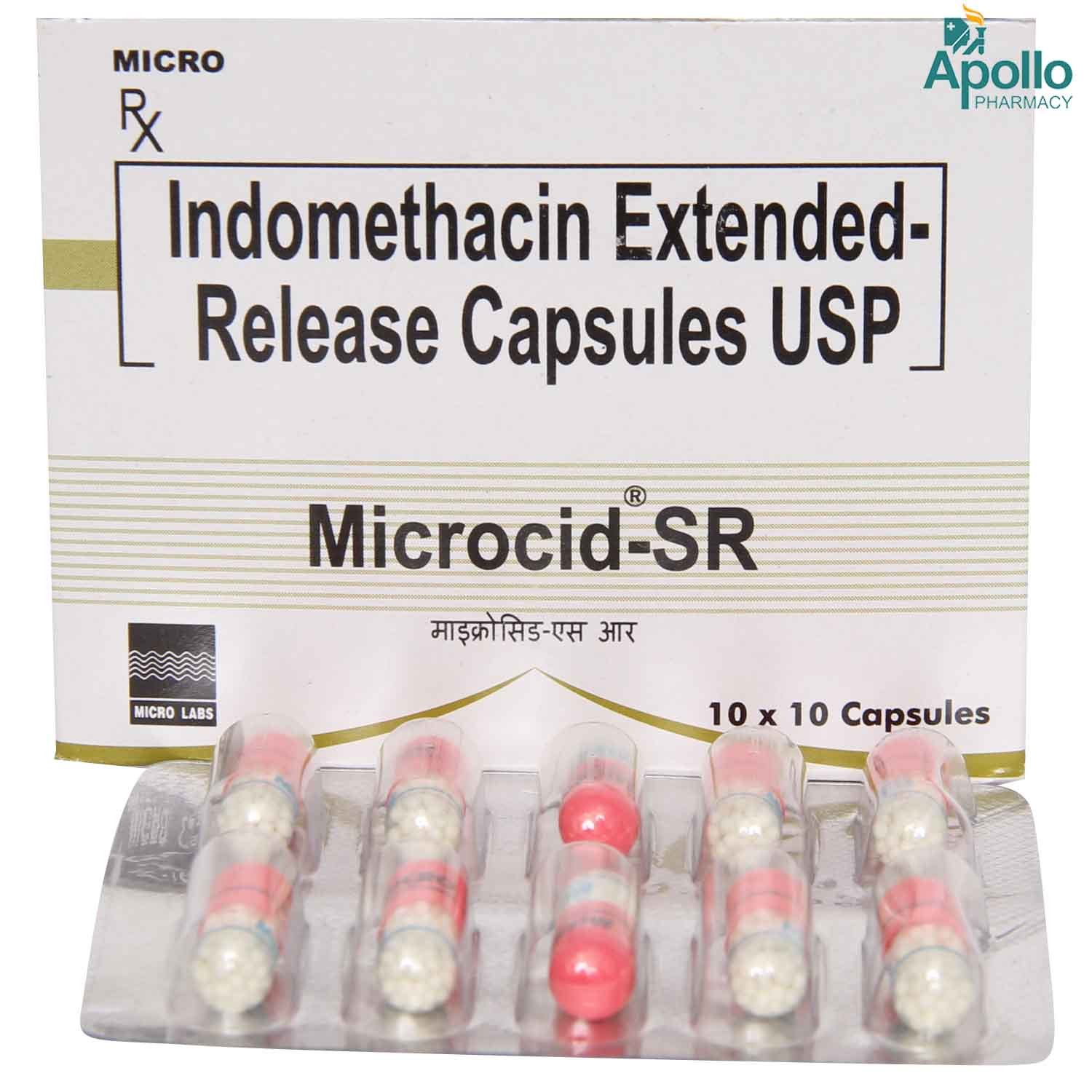
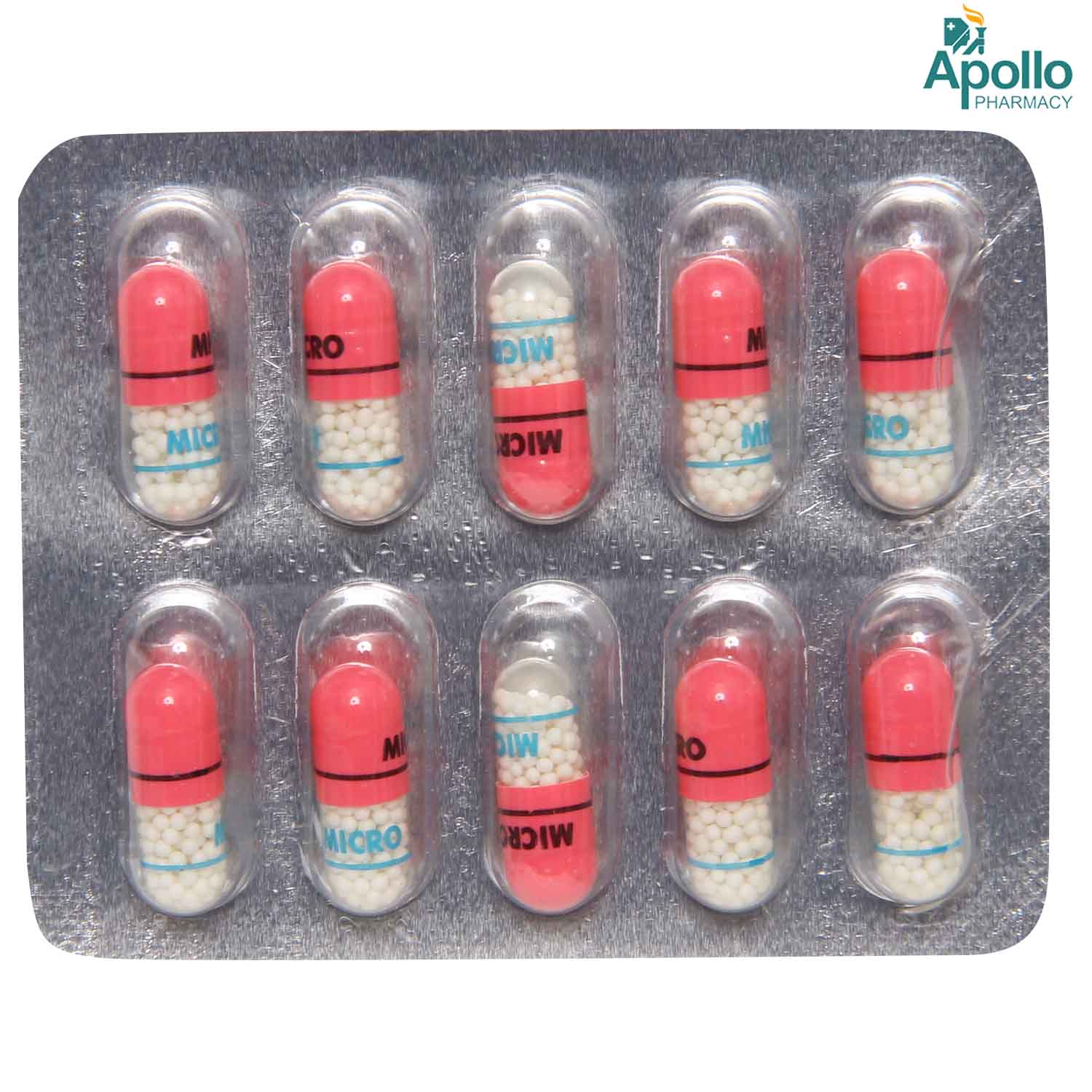
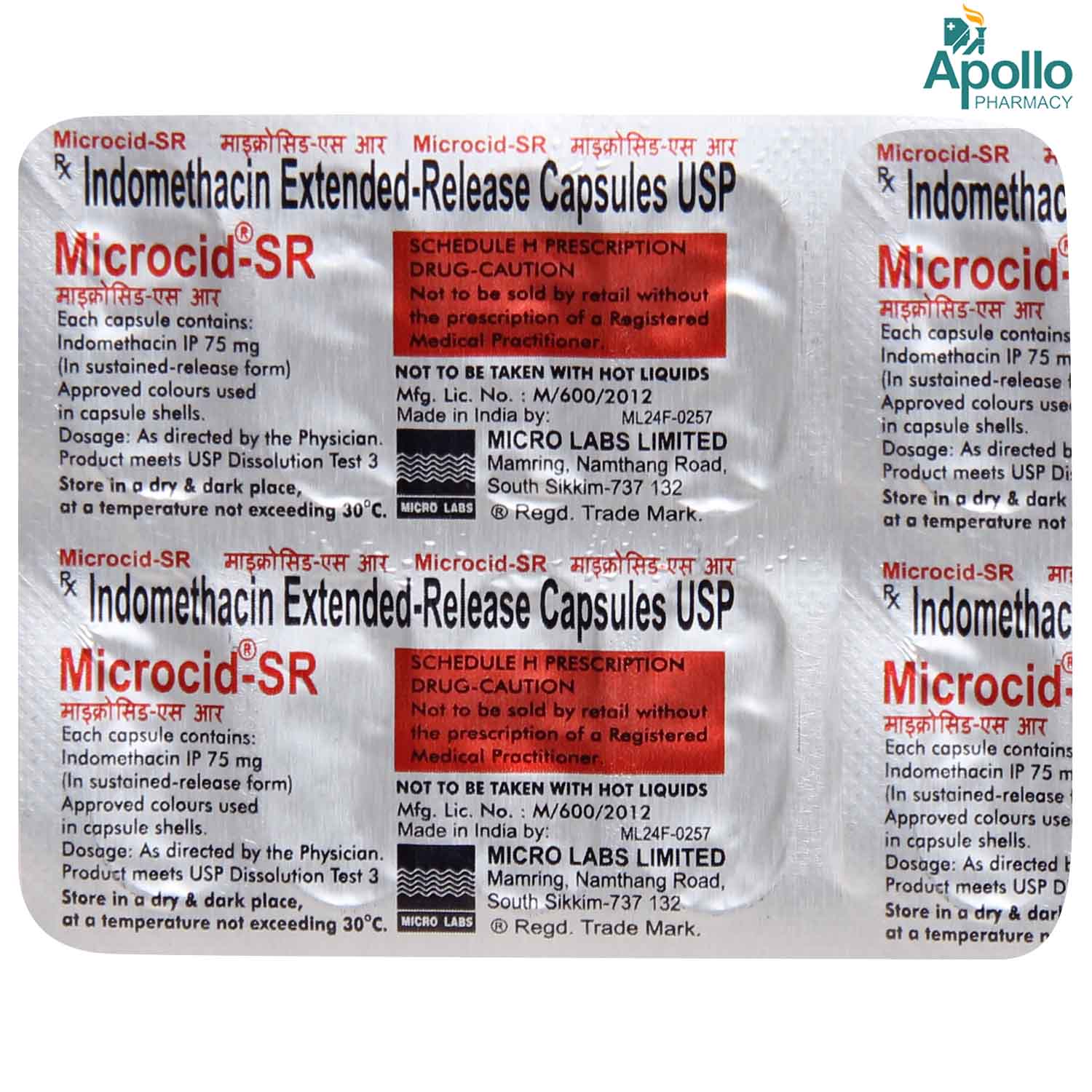












_0.jpg?tr=q-85)

